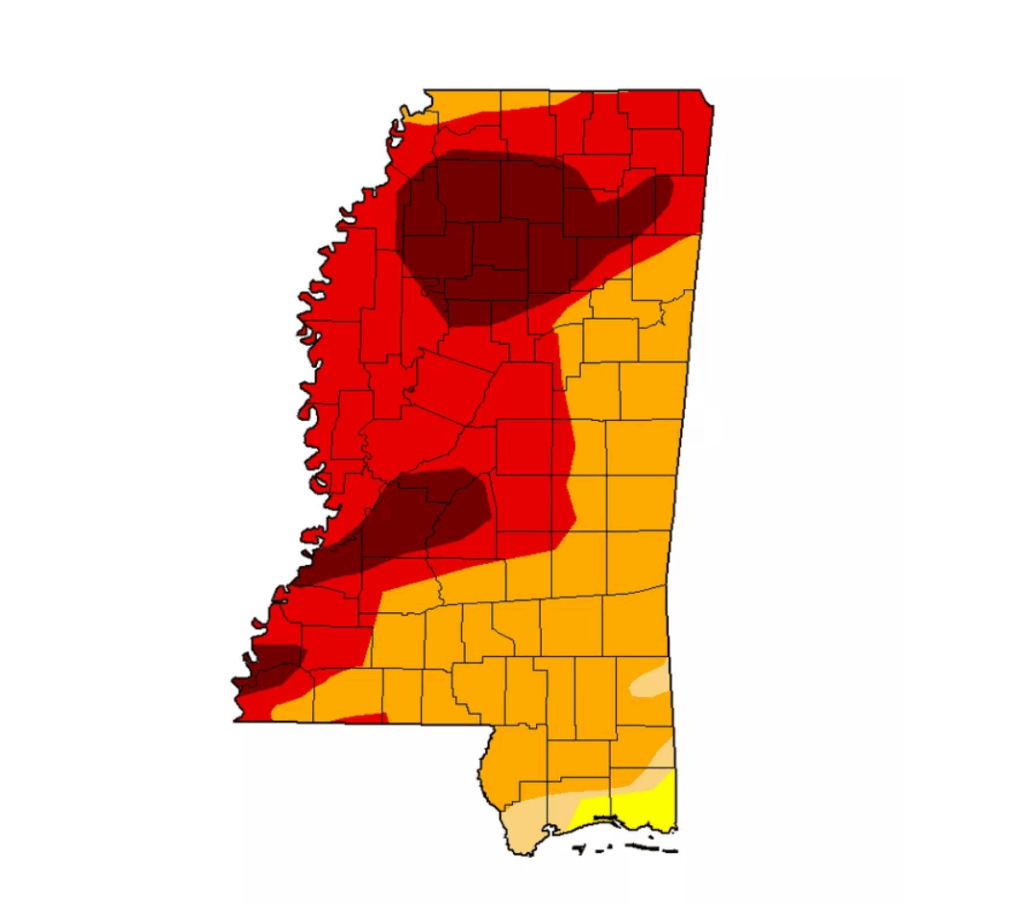Story by Celeste Lay, Julieanna Jackson, Olivia Wright and Hallie Grace Withrow
In the heart of Yazoo County, Clay Adcock has dedicated his life to farming, but this year has been especially difficult.
“I’ve already told everyone, in 37 years of farming, I’ve never had it this hot and this dry,” Adcock said. “We’ve had either one independent of each other. It’s just that this has been really unusual; we’ve had hot dry years before, of course, but nothing like this.”
Much of Mississippi is in the midst of severe or exceptional drought, according to Mike Brown, the state’s climatologist.
“I have been chest deep working with farmers, producers, the Department of Agriculture, the governor’s office, trying to get our emergency declarations, trying to get the drought monitor where it needs to be and those kinds of things for the folks here in Mississippi so they can get some help through either insurance or through low-interest loans and those kinds of things,” Brown said.
Drought Conditions in Mississippi

According to Brown, southern and south-central Mississippi are experiencing one of the worst droughts recorded in close to 30 years. As of November, 44 of Mississippi’s 82 counties have been designated drought disaster areas.
“Some of our ranchers are having to ship off their cattle to other states because hay is not available to them or grasses are not available to them. Some are having to sell things at a loss, using supplemental water, those types of things,” Brown said.
For Adcock, who grows cotton and other crops, things are not quite so bad.
“When you don’t have rain, your production suffers … we are probably off 10 to 15%,” Adcock said.
He is not ready to blame his losses on climate change, however.
“There have been situations just like this in the early 1900s, where it’s just tremendous droughts, and then we’ve had wet seasons … so I think it’s cyclical, and you do the best you can,” Adcock said.
Brown says he and others are trying to understand those cycles and why droughts are changing in Mississippi.
“I’ve noticed that in probably the past decade where droughts have greater impacts all of a sudden, and they come on much more quickly than they used to. It used to be a much more subtle process, and now it’s a much more accelerated process,” he said.
Brown is not sure why.
“Climatically, there have been some small changes, but not enough to really justify what we’re seeing with this drought,” he said.
Brown and others are exploring whether changes in land management practices, such as the types of crops farmers are planting and when they are planting them, might contribute to increases in the frequency and severity of droughts along with some changes in climate.
Whatever is happening, it is affecting more than just farmers and ranchers. Bogia Chelli is the general manager of Silver Creek Gin in Yazoo County. The gin separates cotton fibers from the plant’s seeds, so his business has a good year when local farmers do, too.
“Just north of us, they are picking up a good crop, and further south, they’re picking up a good crop,” Chelli said. “But further south, in Louisiana, it’s pretty rough … here we’re off maybe 300-400 pounds an acre.”
The drought has also shrunk the size of the cotton seeds and potentially the size of the gin’s profits.
“The seeds are smaller, it doesn’t have much seed weight, and it affects how much we make … so it’s going to be a tough one for everybody,” Chelli said.
The gin is located near Yazoo City, home to about 10,000 people. Local resident Julie Johnston says, so far, most of her neighbors have felt little impact from the drought.
“Just mainly when people cut their grass, it’s just dry everywhere,” she said. But she is aware that others have not been so lucky. “It has not impacted us like it has the farmers, and we are very fortunate that it has not done that.”
On Nov. 1, the U.S. Small Business Administration began making disaster loans available to Mississippi farmers and small businesses that have lost money due to drought conditions. For now, Yazoo County is not on the list of those eligible counties, but 12 other Mississippi counties are listed. Brown continues to push for additional support for those hurt by this record drought.

